Love goes very far beyond the physical person of the beloved. It finds its deepest meaning in his spiritual being, his inner self. Whether or not he is actually present, whether or not he is still alive at all, ceases somehow to be of importance.Viktor E. Frankl

I do not forget any good deed done to me & I do not carry a grudge for a bad one.Viktor E. Frankl
We cannot, after all, judge a biography by its length, by the number of pages in it; we must judge by the richness of the contents... Sometimes the 'unfinisheds' are among the most beautiful symphonies.Viktor E. Frankl
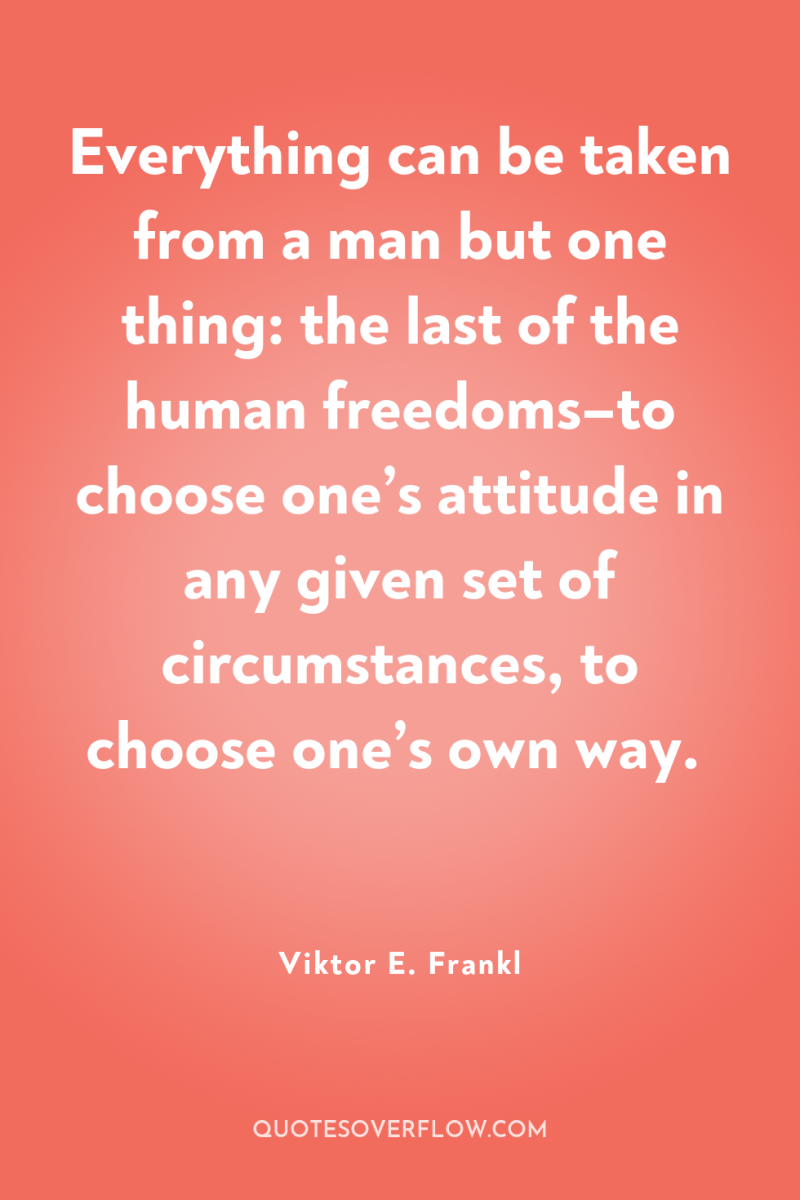
Everything can be taken from a man but one thing: the last of the human freedoms–to choose one’s attitude in any given set of circumstances, to choose one’s own way.Viktor E. Frankl
It did not really matter what we expected from life, but rather what life expected from us. We needed to stop asking about the meaning of life, and instead to think of ourselves as those who were being questioned by life–daily and hourly. Our answer must consist, not in talk and meditation, but in right action and in right conduct. Life ultimately means taking the responsibility to find the right answer to its problems and to fulfill the tasks which it constantly sets for each individual. .Viktor E. Frankl
The pessimist resembles a man who observes with fear and sadness that his wall calendar, from which he daily tears a sheet, grows thinner with each passing day. On the other hand, the person who attacks the problems of life actively is like a man who removes each successive leaf from his calendar and files it neatly and carefully away with its predecessors, after first having jotted down a few diary notes on the back. He can reflect with pride and joy on all the richness set down in these notes, on all the life he has already lived to the fullest. What will it matter to him if he notices that he is growing old? Has he any reason to envy the young people whom he sees, or wax nostalgic over his own lost youth? What reasons has he to envy a young person? For the possibilities that a young person has, the future which is in store for him? No, thank you, ' he will think. 'Instead of possibilities, I have realities in my past, not only the reality of work done and of love loved, but of sufferings bravely suffered. These sufferings are even the things of which I am most proud, although these are things which cannot inspire envy.Viktor E. Frankl
By declaring that man is responsible and must actualize the potential meaning of his life, I wish to stress that the true meaning of life is to be discovered in the world rather than within man or his own psyche, as though it were a closed system. I have termed this constitutive characteristic "the self-transcendence of human existence." It denotes the fact that being human always points, and is directed, to something or someone, other than oneself--be it a meaning to fulfill or another human being to encounter. The more one forgets himself--by giving himself to a cause to serve or another person to love--the more human he is and the more he actualizes himself. What is called self-actualization is not an attainable aim at all, for the simple reason that the more one would strive for it, the more he would miss it. In other words, self-actualization is possible only as a side-effect of self-transcendence.Viktor E. Frankl
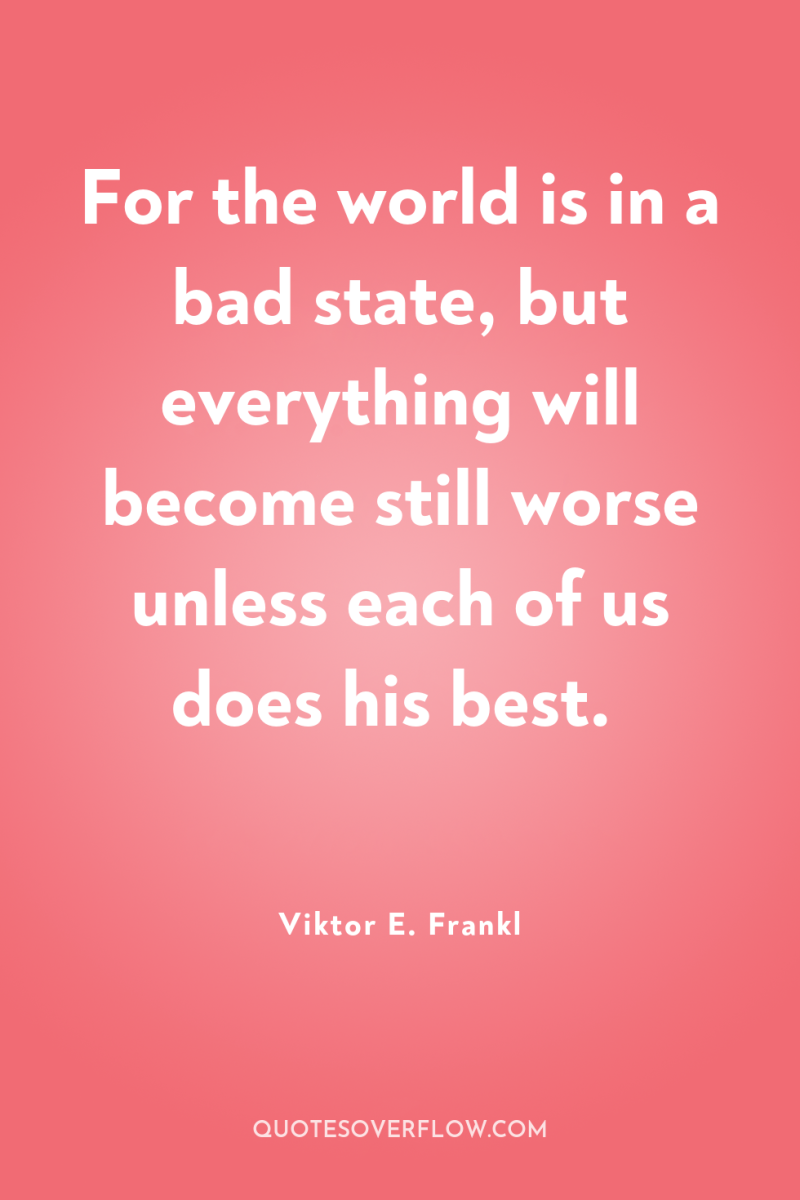
For the world is in a bad state, but everything will become still worse unless each of us does his best.Viktor E. Frankl
What is demanded of man is not, as some existential philosophers teach, to endure the meaninglessness of life, but rather to bear his incapacity to grasp its unconditional meaningfulness in rational terms.Viktor E. Frankl
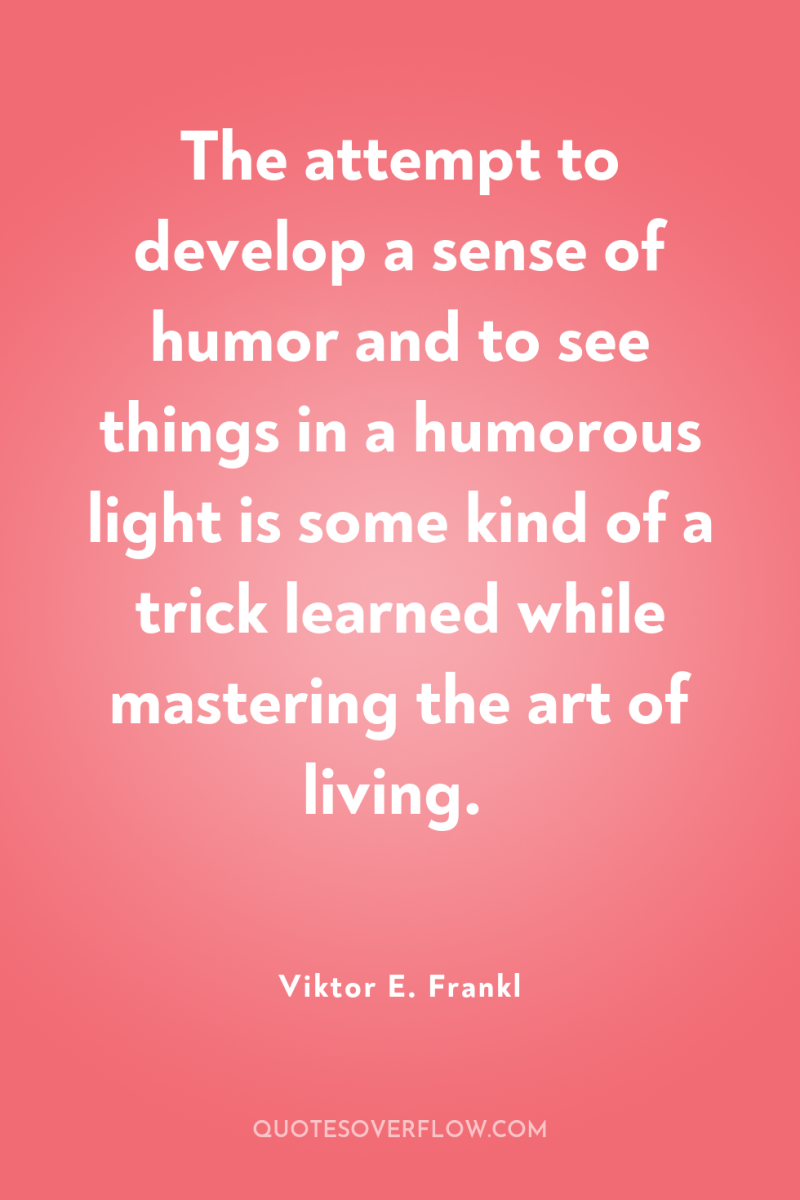
The attempt to develop a sense of humor and to see things in a humorous light is some kind of a trick learned while mastering the art of living.Viktor E. Frankl
Fundamentally, therefore, any man can, even under such circumstances, decide what shall become of him-mentally and spiritually. He may retain his human dignity even in a concentration camp. Dostoevski said once, "There is only one thing that I dread: not to be worthy of my sufferings." These words frequently came to my mind after I became acquainted with those martyrs whose behavior in camp, whose suffering and death, bore witness to the fact that the last inner freedom cannot be lost. It can be said that they were worthy of their sufferings; the way they bore their suffering was a genuine inner achievement. It is this spiritual freedom- which cannot be taken away- that makes life meaningful and purposeful.Viktor E. Frankl
A thought transfixed me: for the first time in my life I saw the truth as it is set into song by so many poets, proclaimed as the final wisdom by so many thinkers. The truth-that love is the ultimate and the highest goal to which a man can aspire. Then I grasped the meaning of the greatest secret that human poetry and human thought and belief have to impart: The salvation of human is through love and in love. I understood how a man who has nothing left in this world still may know bliss, be it only for the brief moment, in the contemplation of his beloved. In a position of utter desolation, when a man cannot express himself in positive action, when his only achievement may consist in enduring his sufferings in the right way-an honorable way-in such a position man can, through loving contemplation of the image he carries of his beloved, achieve fulfillment. For the first time in my life I was able to understand the meaning of the words, " The angels are lost in perpetual contemplation of an infinite glory.Viktor E. Frankl
Don't aim at success. The more you aim at it and make it a target, the more you are going to miss it. For success, like happiness, cannot be pursued; it must ensue, and it only does so as the unintended side effect of one's personal dedication to a cause greater than oneself or as the by-product of one's surrender to a person other than oneself. Happiness must happen, and the same holds for success: you have to let it happen by not caring about it. I want you to listen to what your conscience commands you to do and go on to carry it out to the best of your knowledge. Then you will live to see that in the long-run–in the long-run, I say! –success will follow you precisely because you had forgotten to think about it .Viktor E. Frankl
To the European, it is a characteristic of the American culture that, again and again, one is commanded and ordered to 'be happy.' But happiness cannot be pursued; it must ensue. One must have a reason to 'be happy.' Once the reason is found, however, one becomes happy automatically. As we see, a human being is not one in pursuit of happiness but rather in search of a reason to become happy, last but not least, through actualizing the potential meaning inherent and dormant in a given situation.Viktor E. Frankl

Don’t aim at success–the more you aim at it and make it a target, the more you are going to miss it.Viktor E. Frankl

Fear makes come true that which one is afraid of.Viktor E. Frankl
There is nothing in the world, I venture to say, that would so effectively help one to survive even the worst conditions as the knowledge that there is a meaning in one's life. There is much wisdom in the words of Nietzsche: "He who has a why to live for can bear almost any howViktor E. Frankl
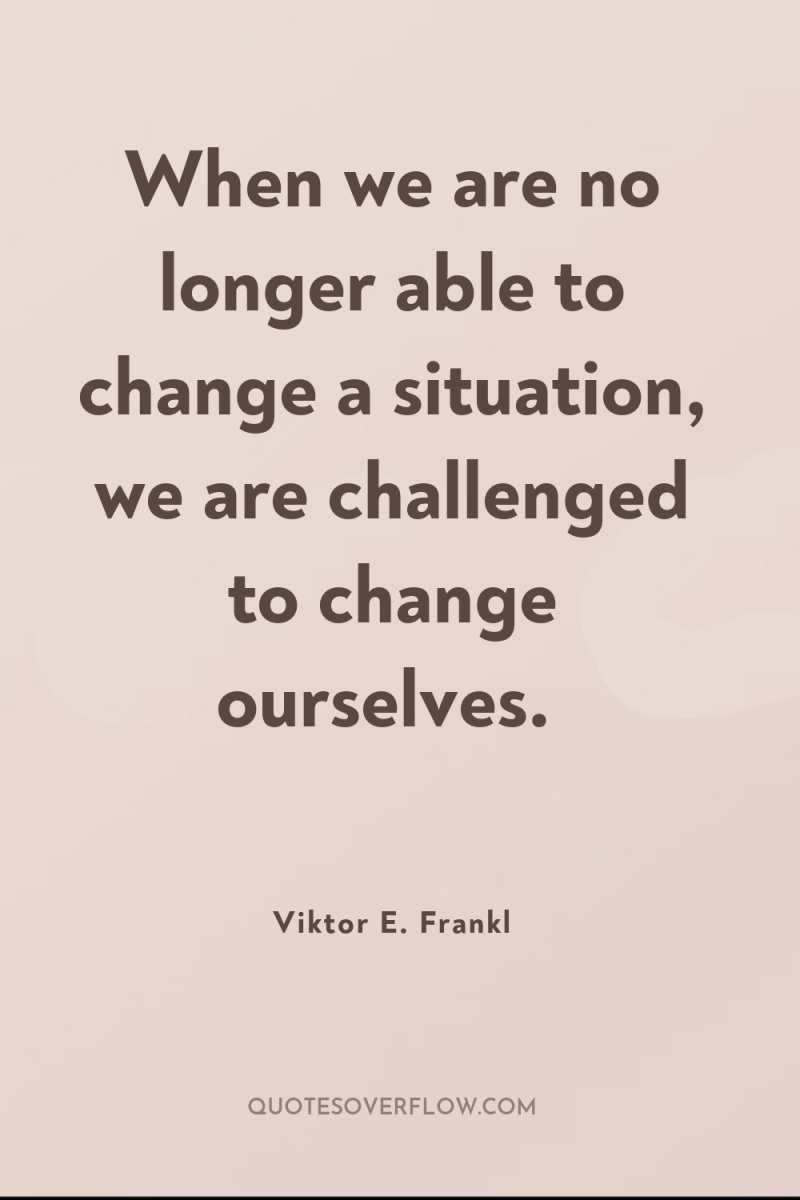
When we are no longer able to change a situation, we are challenged to change ourselves.Viktor E. Frankl
Freedom, however, is not the last word. Freedom is only part of the story and half of the truth. Freedom is but the negative aspect of the whole phenomenon whose positive aspect is responsibleness. In fact, freedom is in danger of degenerating into mere arbitrariness unless it is lived in terms of responsibleness. That is why I recommend that the Statue of Liberty on the East Coast be supplemented by a Statue of Responsibility on the West Coast.Viktor E. Frankl
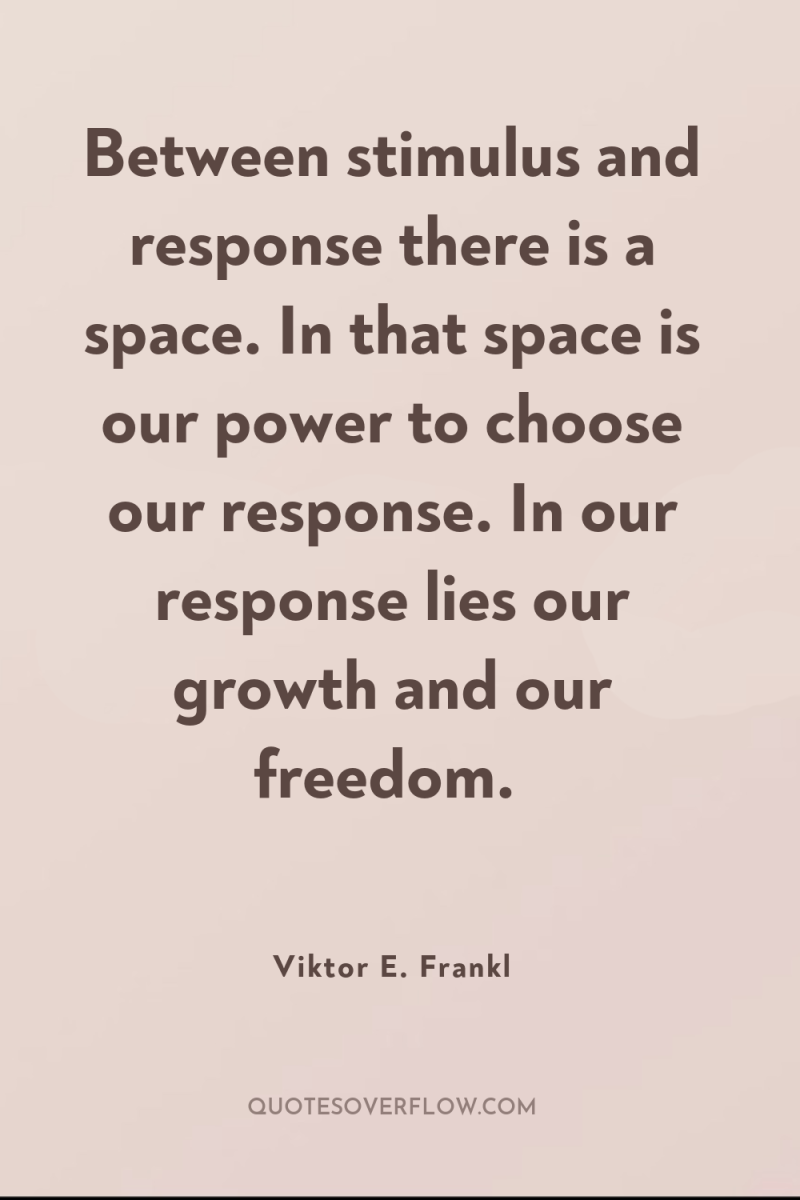
Between stimulus and response there is a space. In that space is our power to choose our response. In our response lies our growth and our freedom.Viktor E. Frankl
In his creative work the artist is dependent on sources and resources deriving from the spiritual unconscious.Viktor E. Frankl
A man who could not see the end of his"provisional existence" was not able to aim at an ultimate goal in life.Viktor E. Frankl
Ironically enough, in the same way that fear brings to pass what one is afraid of, likewise a forced intention makes impossible what one forcibly wishes... Pleasure is, and must remain, a side-effect or by-product, and is destroyed and spoiled to the degree to which it is made a goal in itself.Viktor E. Frankl
A man's concern, even his despair, over the worthwhileness of life is an existential distress but by no means a mental disease.Viktor E. Frankl
The incurable sufferer is given very little opportunity to be proud of his suffering and to consider it ennobling rather than degrading" so that "he is not only unhappy, but also ashamed of being unhappy.Viktor E. Frankl
I consider it a dangerous misconception of mental hygiene to assume that what man needs in the first place is equilibrium or, as it is called in biology, "homeostasis, " i.e., a tensionless state. What man actually needs is not a tensionless state but rather the striving and struggling for a worthwhile goal, a freely chosen task.Viktor E. Frankl
A man's concern, even his despair, over the worthwhileness of life is an existential distress but by no means a mental disease. It may well be that interpreting the first in terms of the latter motivates a doctor to bury his patient's existential despair under a heap of tranquilizing drugs. It is his task, rather , to pilot the patient through his existential crises of growth and development.Viktor E. Frankl
Man's search for meaning is the primary motivation in his life and not a "secondary rationalization" of instinctual drives.Viktor E. Frankl
Love is as primary a phenomenon as sex. Normally, sex is a mode of expression for love. Sex is justified, even sanctified, as soon as, but only as long as, it is a vehicle of love. Thus love is not understood as a mere side-effect of sex; rather, sex is a way of expressing the experience of that ultimate togetherness which is called love.Viktor E. Frankl
[M]ental health is based on a certain degree of tension, the tension between what one has already achieved and what one still ought to accomplish, or the gap between what one is and what one should become. Such a tension is inherent in the human being and therefore is indispensable to mental wellbeing.Viktor E. Frankl
The attempt to develop a sense of humor and to see things in a humorous light is some kind of a trick learned while mastering the art of living. Yet it is possible to practice the art of living even in a concentration camp, although suffering is omnipresent. To draw an analogy: a man's suffering is similar to the behavior of gas. If a certain quantity of gas is pumped into an empty chamber, it will fill the chamber completely and evenly, no matter how big the chamber. Thus suffering completely fills the human soul and conscious mind, no matter whether the suffering is great or little. Therefore the "size" of human suffering is absolutely relative.Viktor E. Frankl
We have to consider that a man who has been under such enormous mental pressure for such a long time is naturally in some danger after his liberation, especially since the pressure was released quite suddenly. This danger (in the sense of psychological hygiene) is the psychological counterpart of the bends. Just as the physical health of the caisson worker would be endangered if he left his diver's chamber suddenly (where he is under enormous atmospheric pressure), so the man who has suddenly been liberated from mental pressure can suffer damage to his moral and spiritual health.Viktor E. Frankl
The way in which a man accepts his fate and all the suffering it entails, the way in which he takes up his cross, gives him ample opportunity–even under the most difficult circumstances–to add a deeper meaning to his life. It may remain brave, dignified and unselfish. Or in the bitter fight for self-preservation he may forget his human dignity and become no more than an animal. Here lies the chance for a man either to make use of or to forgo the opportunities of attaining the moral values that a difficult situation may afford him. .Viktor E. Frankl
An active life serves the purpose of giving man the opportunity to realize values in creative work, while a passive life of enjoyment affords him the opportunity to obtain fulfillment in experiencing beauty, art, or nature. But there is also purpose in that life which is almost barren of both creation and enjoyment and which admits of but one possibility of high moral behavior: namely, in man's attitude to his existence, an existence restricted by external forces. A creative life and a life of enjoyment are banned to him. But not only creativeness and enjoyment are meaningful. If there is a meaning in life at all, then there must be a meaning in suffering. Suffering is an ineradicable part of life, even as fate and death. Without suffering and death human life cannot be complete. .Viktor E. Frankl
[T]here are two races of men in this world, but only these two -- the "race" of the decent man and the "race" of the indecent man. Both are found everywhere; they penetrate into all groups of society. No group consists entirely of decent or indecent people.Viktor E. Frankl
Freedom" -- we repeated to ourselves, and yet we could not grasp it. We had said this word so often during all the years we dreamed about it, that it had lost its meaning. Its reality did not penetrate into our consciousness; we could not grasp the fact that freedom was ours.Viktor E. Frankl
I think it was Lessing who once said, 'There are things which must cause you to lose your reason or you have none to lose'. An abnormal reaction to an abnormal situation is normal behaviour".Viktor E. Frankl
Thus suffering completely fills the human soul and conscious mind, no matter whether the suffering is great or little. Therefore the 'size' of human suffering is absolutely relative".Viktor E. Frankl
In the past, nothing is irretrievably lost, but rather, on the contrary, everything is irrevocably stored and treasured. To be sure, people tend to see only the stubble fields of transitoriness but overlook and forget the full granaries of the past into which they have brought the harvest of their lives: the deeds done, the loves loved, and last but not least, the sufferings they have gone through with courage and dignity. From this one may see that there is no reason to pity the old people. Instead, young people should envy them. It is true that the old have no opportunities, no possibilities in the future. But they have more than that: Instead of possibilities in the future, they have realities in the past -the potentialities they have actualized, the meanings they have fulfilled, the values they have realized -and nothing and nobody can ever remove these assets from the past.Viktor E. Frankl
Instead of possibilities, I have realities in my past, not only the reality of work done and of love loved, but of sufferings bravely suffered. These sufferings are even the things of which I am most proud, though these are things which cannot inspire envy.Viktor E. Frankl
The salvation of man is through love and in loveViktor E. Frankl
Thus far we have shown that the meaning of life always changes, but that it never ceases to be. According to logotherapy, we can discover this meaning in life in three different ways: (1) by creating a work or doing a deed; (2) by experiencing something or encountering someone; and (3) by the attitude we take toward unavoidable suffering.Viktor E. Frankl
I shall never forget how I was roused one night by the groans of a fellow prisoner, who threw himself about in his sleep, obviously having a horrible nightmare. Since I had always been especially sorry for people who suffered from fearful dreams or deliria, I wanted to wake the poor man. Suddenly I drew back the hand which was ready to shake him, frightened at the thing I was about to do. At that moment I became intensely conscious of the fact that no dream, no matter how horrible, could be as bad as the reality of the camp which surrounded us, and to which I was about to recall him. .Viktor E. Frankl
The story of the young woman whose death I witnessed in a concentration camp. It is a simple story. There is little to tell and it may sound as if I had invented it; but to me it seems like a poem. This young woman knew that she would die in the next few days. But when I talked to her she was cheerful in spite of this knowledge. "I am grateful that fate has hit me so hard, " she told me. "In my former life I was spoiled and did not take spiritual accomplishments seriously." Pointing through the window of the hut, she said, "This tree here is the only friend I have in my loneliness." Through that window she could see just one branch of a chestnut tree, and on the branch were two blossoms. "I often talk to this tree, " she said to me. I was startled and didn't quite know how to take her words. Was she delirious? Did she have occasional hallucinations? Anxiously I asked her if the tree replied. "Yes." What did it say to her? She answered, "It said to me, 'I am here- I am here- I am life, eternal life.Viktor E. Frankl
As long as a self is driven by an id to a Thou, it is not a matter of love, either. In love the self is not driven by the id, but rather the self chooses the Thou.Viktor E. Frankl
An abnormal reaction to an abnormal situation is normal behavior.Viktor E. Frankl
But today’s society is characterized by achievement orientation, and consequently it adores people who are successful and happy and, in particular, it adores the young. It virtually ignores the value of all those who are otherwise, and in so doing blurs the decisive difference between being valuable in the sense of dignity and being valuable in the sense of usefulness. If one is not cognizant of this difference and holds that an individual’s value stems only from his present usefulness, then, believe me, one owes it only to personal inconsistency not to plead for euthanasia along the lines of Hitler’s program, that is to say, ‘mercy’ killing of all those who have lost their social usefulness, be it because of old age, incurable illness, mental deterioration, or whatever handicap they may suffer. Confounding the dignity of man with mere usefulness arises from conceptual confusion that in turn may be traced back to the contemporary nihilism transmitted on many an academic campus and many an analytical couch. .Viktor E. Frankl
As each situation in life represents a challenge to man and presents a problem for him to solve, the question of the meaning of life may actually be reversed. Ultimately, man should not ask what the meaning of his life is, but rather he must recognize that it is he who is asked. In a word, each man is questioned by life; and he can only answer to life by answering for his own life; to life he can only respond by being responsible. Thus, logotherapy sees in responsibleness the very essence of human existence. .Viktor E. Frankl
The question was whether an ape which was being used to develop a poliomyelitis serum, and for this reason punctured again and again, would ever be able to grasp the meaning of its suffering. Unanimously, the group replied that of course it would not; with its limited intelligence, it could not enter into the world of man, i.e., the only world in which the meaning of its suffering would be understandable. Then I pushed forward with the following question: ‘And what about man? Are you sure that the the human world is a terminal point in the evolution of the cosmos? Is it not conceivable that there is still another dimension, a world beyond man’s world; a world in which the question of an ultimate meaning of human suffering would find an answer? .Viktor E. Frankl
Our generation is realistic, for we have come to know man as he really is. After all, man is that being who in vented the gas chambers of Auschwitz; however, he is also that being who entered those gas chambers upright, with the Lord's Prayer or the Shema Yisrael on his lips.Viktor E. Frankl
People tend to see only the stubble fields of transitoriness but overlook and forget the full granaries of the past into which they have brought the harvest of their lives: the deeds done, the loves loved, and last but not least, the sufferings they have gone through with courage and dignity.Viktor E. Frankl
As to the causation, of the feeling of meaningless, one may say, albeit in an oversimplifying way, that people have enough to live by but nothing to live for; they have the means but no meaning.Viktor E. Frankl
When a person can't find a deep sense of meaning, they distract themselves with pleasure.Viktor E. Frankl
Happiness, cannot be pursued; it must ensue, and it only does so as the unintended side-effect of one's dedication to a cause greater than oneself or as the by-product of one's surrender to a person other than oneself.Viktor E. Frankl
Once, an elderly general practitioner consulted me because of his severe depression. He could not overcome the loss of his wife who had died two years before and whom he had loved above all else. Now, how can I help him? What should I tell him? Well, I refrained from telling him anything but instead confronted him with the question, “What would have happened, Doctor, if you had died first, and your wife would have had to survive you?” “Oh, ” he said, “for her this would have been terrible; how she would have suffered! ” Whereupon I replied, “You see, Doctor, such a suffering has been spared her, and it was you who have spared her this suffering – to be sure, at the price that now you have to survive and mourn her.” He said no word but shook my hand and calmly left my office. In some way, suffering ceases to be suffering at the moment it finds a meaning, such as the meaning of a sacrifice. .Viktor E. Frankl
Each of us has his own inner concentration camp... We must deal with, with forgiveness and patience-as full human beings, as we are and what we will become.Viktor E. Frankl
Was Du erlebst, kann keine Macht der Welt Dir rauben. (What you have experienced, no power on earth can take from you.) Not only our experiences, but all we have done, whatever great thoughts we may have had and all we have suffered, all this is not lost, though it is past; we have brought it into being. Having been is a kind of being, and perhaps the surest kind.Viktor E. Frankl
Not every conflict is necessarily neurotic; some amount of conflict is normal and healthy. In a similar sense suffering is not always a pathological phenomenon; rather than being a symptom of neurosis, suffering may well be a human achievement, especially if the suffering grows out of existential frustration... Existential frustration is neither pathological or pathogenic.Viktor E. Frankl
For as soon as we have used an opportunity and have actualized a potential meaning, we have done so once and for all. We have rescued it into the past/.../, wherein nothing is irretrievably lost, but rather, on the contrary, everything is irrevocably stored and treasured.Viktor E. Frankl
Sigmund Freud once asserted, "Let one attempt to expose a number of the most diverse people uniformly to hunger. With the increase of the imperative urge of hunger all individual differences will blur, and in their stead will appear the uniform expression of the one unstilled urge." Thank heaven, Sigmund Freud was spared knowing the concentration camps from the inside. His subjects lay on a couch designed in the plush style of Victorian culture, not in the filth of Auschwitz. There, the "individual differences" did not "blur" but, on the contrary, people became more different; people unmasked themselves, both the swine and the saints. .Viktor E. Frankl
Everywhere man is confronted with fate, with the chance of achieving something through his own suffering.Viktor E. Frankl
A man's suffering is similar to the behavior of gas. If a certain quantity of gas is pumped into an empty chamber, it will fill the chamber completely and evenly, no matter how big the chamber. Thus suffering completely fills the human soul and conscious mind, no matter whether the suffering is great or little. Therefore the 'size' of human suffering is absolutely relative.Viktor E. Frankl
Suffering ceases to be suffering at the moment it finds a meaning, such as the meaning of scarificeViktor E. Frankl
Unnecessary suffering is masochistic rather than heroic.Viktor E. Frankl
The way in which a man accepts his fate and all the suffering it entails, the way un which he takes up his cross, gives him ample opportunity -even under the most difficult circumstances- to add a deeper meaning to his life. It may remain brave, dignified and unselfish. Or in the bitter fight for self-preservation he may forget his human dignity and become no more than an animal. Here lies the chance for a man either to make use of or forgo the opportunities of attaining the moral values that a difficult situation may afford him. And this decides whether he is worthy of his sufferings or not".Viktor E. Frankl
Life requires of man spiritual elasticity, so that he may temper his efforts to the chances that are offered.Viktor E. Frankl
Our generation is realistic, for we have come to know man as he really is. After all, man is that being who invented the gas chambers of Auschwitz; however, he is also that being who entered those gas chambers upright, with the Lord's Prayer or the Shema Yisrael on his lips.Viktor E. Frankl
We have come to know Man as he really is. After all, man is that being who invented the gas chambers of Auschwitz; however, he is also that being who entered those gas chambers upright.Viktor E. Frankl
On the average, only those prisoners could keep alive who, after years of trekking from camp to camp, had lost all scruples in their fight for existence; they were prepared to use every means, honest and otherwise, even brutal force, theft, and betrayal of their friends, in order to save themselves. We who have come back, by the aid of many lucky chances or miracles - whatever one may choose to call them - we know: the best of us did not return.Viktor E. Frankl
The truth-that love is the highest goal to which man can aspire.Viktor E. Frankl
We who lived in concentration camps can remember the men who walked through the huts comforting others, giving away their last piece of bread. They may have been few in number, but they offer sufficient proof that everything can be taken from a man but one thing: the last of the human freedoms -- to choose one's attitude in any given set of circumstances, to choose one's own way.Viktor E. Frankl
He who knows the 'Why' for his existence is able to bear almost any 'How'.Viktor E. Frankl
I refer to what is called mysterium iniquitatis, meaning, as I see it, that a crime in the final analysis remains inexplicable inasmuch as it cannot be fully traced back to biological, psychological and/or sociological factors. Totally explaining one’s crime would be tantamount to explaining away his or her guilt and to seeing in him or her not a free and responsible human being but a machine to be repaired. Even criminals themselves abhor this treatment and prefer to be held responsible for their deeds. From a convict serving his sentence in an Illinois penitentiary I received a letter in which he deplored that 'the criminal never has a chance to explain himself. He is offered a variety of excuses to choose from. Society is blamed and in many instances the blame is put on the victim.Viktor E. Frankl
No-one will be able to make us believe that man is a sublimated animal once we can show that within him there is a repressed angel.Viktor E. Frankl
If you treat people to a vision of themselves, if you apparently overrate them, you make them become what they are capable of becoming.Viktor E. Frankl
We have absolutely no control over what happens to us in life but what we have paramount control over is how we respond to those events.Viktor E. Frankl
Don’t aim at success–the more you aim at it and make it a target, the more you are going to miss it. For success, like happiness, cannot be pursued; it must ensue…as the unintended side-effect of one’s personal dedication to a course greater than oneself.Viktor E. Frankl
Even though conditions such as lack of sleep, insufficient food and various mental stresses may suggest that the inmates were bound to react in certain ways, in the final analysis it becomes clear that the sort of person the prisoner became was the result of an inner decision, and not the result of camp influences alone.Viktor E. Frankl
At the beginning of human history, man lost some of the basic animal instincts in which an animal's behavior is embedded and by which it is secured. Such security, like paradise, is closed to man forever; man has to make choices. In addition to this, however, man has suffered another loss in his more recent development inasmuch as the traditions which buttressed his behavior are now rapidly diminishing. No instinct tells him what he has to do, and no tradition tells him what he ought to do; sometimes he does not even know what he wishes to do. Instead, he either wishes to do what other people do (conformism) or he does what other people tell him to do (totalitarianism).Viktor E. Frankl
We had to learn ourselves and, furthermore, we had to teach the despairing men, that it did not really matter what we expected from life, but rather what life expected from us. We need to stop asking about the meaning of life, and instead to think of ourselves as those who were being questioned by life–hourly and daily. Our answer must consist not in talk and meditation, but in right action and in right conduct. Life ultimately means taking the responsibility to find the right answers to its problems and to fulfill the task which it constantly sets for each individual. .Viktor E. Frankl
If there is meaning in life at all, then there must be meaning in suffering.Viktor E. Frankl
A life of short duration...could be so rich in joy and love that it could contain more meaning than a life lasting eighty years.Viktor E. Frankl
Love is the only way to grasp another human being in the innermost core of his personality. No one can become fully aware of the very essence of another human being unless he loves him. By his love he is enabled to see the essential traits and features in the beloved person; and even more, he sees that which is potential in him, which is not yet actualized but yet ought to be actualized. Furthermore, by his love, the loving person enables the beloved person to actualize these potentialities. By making him aware of what he can be and of what he should become, he makes these potentialities come true. In logotherapy, love is not interpreted as a mere epiphenomenon of sexual drives and instincts in the sense of a so-called sublimation. Love is as primary a phenomenon as sex. Normally, sex is a vehicle of expression for love. Sex is justified, even sanctified, as soon as, but only as long as, it is a vehicle of love. Thus love is not understood as a mere side-effect of sex; rather, sex is a way of expressing the experience of that ultimate togetherness which is called love. .Viktor E. Frankl
Having been is the surest kind of being.Viktor E. Frankl
No one has the right to do wrong, even if wrong has been done to them.Viktor E. Frankl
Everything can be taken from a man but one thing: the last of human freedoms - to choose one's attitude in any given set of circumstances, to choose one's own way.Viktor E. Frankl
The last of human freedoms - the ability to chose one's attitude in a given set of circumstances.Viktor E. Frankl
Challenging the meaning of life is the truest expression of the state of being human.Viktor E. Frankl
A man who becomes conscious of the responsibility he bears toward a human being who affectionately waits for him, or to an unfinished work, will never be able to throw away his life. He knows the 'why' for his existence, and will be able to bear almost any 'how.'Viktor E. Frankl
If there is a meaning in life at all, then there must be a meaning in suffering. Suffering is an ineradicable part of life, even as fate and death. Without suffering and death, human life cannot be complete.Viktor E. Frankl
Happiness must happen, and the same holds for success: you have to let it happen by not caring about it.Viktor E. Frankl
To the European, it is a characteristic of the American culture that, again and again, one is commanded and ordered to 'be happy.' But happiness cannot be pursued; it must ensue. One must have a reason to 'be happy.'Viktor E. Frankl
Religion is the search for ultimate meaning.Viktor E. Frankl
Live as if you were living a second time, and as though you had acted wrongly the first time.Viktor E. Frankl
There is nothing in the world, I venture to say, that would so effectively help one to survive even the worst conditions as the knowledge that there is a meaning in one's life.Viktor E. Frankl
Fear may come true that which one is afraid of.Viktor E. Frankl
A thought transfixed me: for the first time in my life, I saw the truth as it is set into song by so many poets, proclaimed as the final wisdom by so many thinkers. The truth - that love is the ultimate and the highest goal to which man can aspire.Viktor E. Frankl
In a position of utter desolation, when man cannot express himself in positive action, when his only achievement may consist in enduring his sufferings in the right way - an honorable way - in such a position man can, through loving contemplation of the image he carries of his beloved, achieve fulfillment.Viktor E. Frankl
Faith is trust in ultimate meaning.Viktor E. Frankl
For the meaning of life differs from man to man, from day to day and from hour to hour. What matters, therefore, is not the meaning of life in general but rather the specific meaning of a person's life at a given moment.Viktor E. Frankl